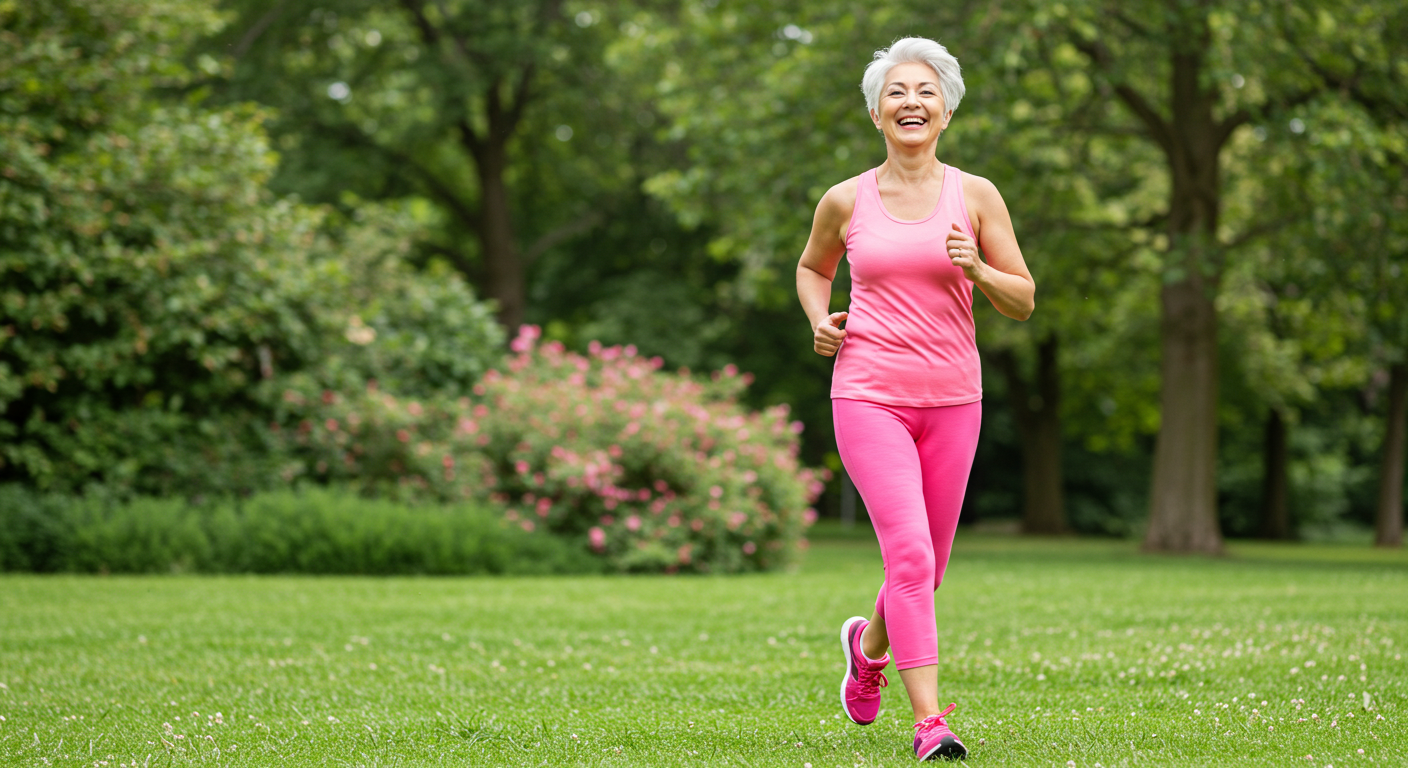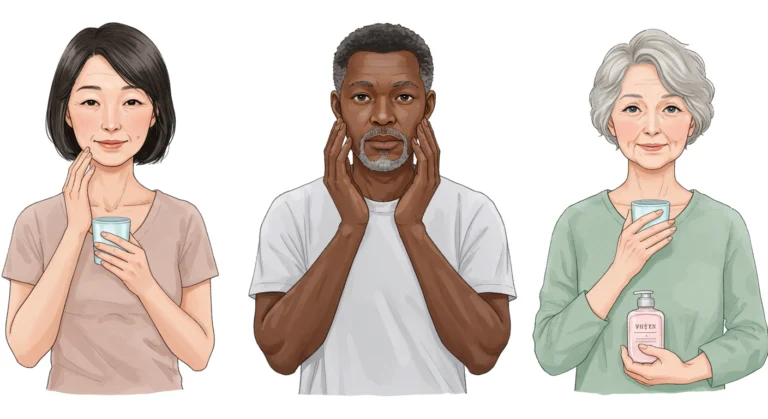Your Guide to Healthy Aging: Tips for a Vibrant Life
Remember a time when you looked up to someone in their golden years? Maybe it was a neighbor who gardened every day, a friend who traveled the world, or a family member who loved to share stories. Their energy and joy showed us that aging doesn’t mean giving up. Healthy aging is about taking care of your mind, body, and spirit to live fully, no matter your age.
The choices we make today can help us live longer and better. They turn time into a friend, not an enemy.

Key Takeaways from Healthy Aging
- Healthy aging prioritizes balance across physical activity, diet, and mental health.
- Longevity secrets include preventive care, social connections, and lifelong learning.
- Small daily habits—like hydration or brain games—build toward a resilient, fulfilling future.
- Proactive steps now reduce risks of chronic conditions and enhance independence.
- Aging vibrantly requires addressing emotional well-being alongside physical health.
Table of Contents
- Understanding Healthy Aging: More Than Just Years
- Nutrition Fundamentals for Longevity
- Physical Activity: Your Best Age-Defying Strategy
- Maintaining Cognitive Function As You Age
- Wellness Practices for Senior Citizen Well-Being
- Addressing Age-Related Health Challenges Proactively
- Conclusion: Embracing Your Journey to Aging Gracefully
- FAQ
- What are some effective anti-aging strategies I can implement in my daily routine?
- How does nutrition impact wellness in older adults?
- What are the most important senior health tips for maintaining physical fitness?
- Are there specific longevity secrets that can help me age gracefully?
- How can I proactively address age-related health issues?
- What role does hydration play in senior citizen well-being?
- Can wellness practices really make a difference in my quality of life?
- What are some age-defying practices I can adopt at home?
- When should I consider seeking professional help for cognitive health concerns?
Understanding Healthy Aging: More Than Just Years
Your journey to healthy aging starts with understanding the science behind aging. It’s about separating facts from fiction. Let’s explore how your body changes and what you can control.
The Science Behind How We Age
in your body undergo natural wear and tear over time. Telomeres, protective caps on DNA strands, shorten with age, affecting cell function. Oxidative stress from free radicals also plays a role. But lifestyle choices like diet and exercise can slow these processes. The National Institute on Aging notes that proactive habits shape how well you age.
Common Myths About Aging Debunked
- Myth 1: “Memory loss is inevitable with age.” Fact: While some forgetfulness occurs, severe decline isn’t a guarantee—mental stimulation helps maintain sharpness.
- Myth 2: “Exercise isn’t safe for older adults.” Fact: Physical activity reduces risks like osteoporosis and boosts mobility when done safely.
- Myth 3: “You can’t learn new skills at 60+.” Fact: Neuroplasticity allows brain growth at any age—learning new hobbies remains possible.
Setting Realistic Expectations for Your Later Years
Accept natural changes like slower metabolism or graying hair. But prioritize what you can influence: staying socially connected, managing chronic conditions early, and moving daily. Healthy aging isn’t about stopping time—it’s about thriving within your body’s evolving needs.
“Small daily choices compound into long-term age-related health outcomes.”
Nutrition Fundamentals for Longevity
Your plate is key to a healthy, active life. Simple senior health tips like choosing anti-inflammatory foods can make meals into longevity secrets. These tips help lower disease risks and increase energy.
Anti-Inflammatory Foods That Support Aging Well
Inflammation causes many age-related problems. Here are foods to fight it:
- Fatty fish (salmon, mackerel) rich in omega-3s
- Berries packed with antioxidants
- Leafy greens like spinach and kale
- Nuts and seeds for crunch and nutrients

Hydration and Its Impact on Senior Health
As we age, our thirst signals get weaker. Staying hydrated is a silent battle. Here are senior health tips to help:
- Carry a water bottle marked with hourly targets
- Enjoy herbal teas or broths between meals
- Track intake via apps like MyFitnessPal
Supplements Worth Considering (And Which to Avoid)
Always talk to your doctor before starting supplements. Here are some good ones:
- Try: Vitamin D3, B12, calcium, and omega-3 fish oil
- Avoid: Unregulated “superfood” blends without scientific proof
“Vitamin D deficiency affects 1 in 3 seniors—regular testing is key.” – National Institute on Aging
Making small changes in how we eat can lead to big wellness gains. These habits lay the groundwork for a long, healthy life.
Physical Activity: Your Best Age-Defying Strategy
Moving your body regularly is a key age-defying practice. Exercise not only boosts energy but also slows aging at a cellular level. Even small changes in activity can improve heart health, muscle strength, and mobility.
- Cardiovascular Training: Brisk walking, swimming, or cycling 3-4 times weekly strengthens your heart and reduces inflammation.
- Strength Training: Use resistance bands or light weights twice a week to combat muscle loss and build bone density.
- Flexibility Work: Yoga or stretching sessions improve joint health and reduce stiffness.
- Balance Exercises: Tai chi or heel-to-toe walking lower fall risk, critical for maintaining independence.
“Starting yoga at 75 changed my life. I feel stronger and more confident than ever.” – Mary, 82
Concerned about pain or mobility? Adapt exercises to your needs. Water aerobics eases joint strain, and chair-based strength moves build muscle without pressure. Always consult a healthcare provider before starting, but know it’s never too late to begin. Studies show even those in their 80s gain benefits within months.

Exercise triggers your body to repair cells, boost growth hormones, and protect telomeres—parts of DNA linked to aging. Small steps count: a 10-minute walk or arm curls with soup cans add up. Local community centers often offer senior-friendly programs like SilverSneakers, designed for all fitness levels. Prioritize consistency over intensity, and watch how anti-aging strategies transform your daily life.
Maintaining Cognitive Function As You Age
Keeping your mind sharp and memory strong is crucial for healthy aging. Simple daily habits can help protect your brain and boost your overall health. Here are some tips to keep your mind sharp as you get older.
Brain Games and Mental Exercises for Sharpness
Try activities that challenge your brain. Learning a new skill, like playing a musical instrument, or taking online courses can be great. Solving puzzles also helps keep your mind active.
Studies show that activities like chess, painting, or coding are good for your brain. Apps like Lumosity or Duolingo offer mental workouts. Spend 20-30 minutes each day to keep your mind sharp.
Social Engagement and Cognitive Health
Staying connected is important. Talking to others, volunteering, or joining clubs can help your brain. A 2022 study in Journal of Gerontology found that active social lives improve memory.
Look into community centers, book clubs, or programs that bring different ages together. Even online meetings can help your mental health.
When to Seek Help for Memory Issues
- Struggling with familiar tasks (e.g., balancing a checkbook)
- Repeating questions in the same conversation
- Difficulty recalling recent events or names
If you find yourself struggling with these tasks often, see a neurologist. Early diagnosis can help treat problems like vitamin deficiencies or side effects from medication. Don’t wait—timely care can make a big difference for conditions like dementia.
Wellness Practices for Senior Citizen Well-Being
Wellness for older adults focuses on key areas often missed. Making small changes in daily life can greatly improve energy, mood, and independence. Here’s how to focus on your health.
Sleep optimization begins with understanding how aging changes sleep. Aim for 7-8 hours, even if waking up early feels natural. Reduce screen time in the evening, keep your bedroom cool and dark, and avoid big meals before bed.
If you have trouble sleeping or snore a lot, see a doctor. Sleep apnea affects 26% of seniors and can disrupt sleep.
“Good sleep isn’t a luxury—it’s preventive medicine.” — National Sleep Foundation
Managing stress is crucial for both mind and body. Try these effective methods:
- 5-4-3-2-1 grounding method to calm anxiety
- Box breathing (4-second inhale/hold/exhale cycles)
- Low-impact yoga or chair-based stretching
- Daily gratitude journaling
Preventative care means taking proactive steps. Make sure to get these screenings every year:
- Blood pressure and cholesterol checks
- Colon and breast/prostate cancer screenings
- Bone density tests after age 65
- Eye and dental exams
Don’t forget flu shots, shingles vaccine at 50+, and pneumonia vaccines. Always bring a list of your current medications to doctor’s appointments.
Senior citizen well-being improves when you take charge. Ask questions, track symptoms, and create routines that respect your body’s needs. Small steps today lead to long-term strength.
Addressing Age-Related Health Challenges Proactively
Proactive care can change how you handle age-related health issues. Regular check-ups and tracking symptoms early can catch problems before they get worse. Simple actions like daily walks or eating leafy greens can help slow down joint stiffness or bone loss.
Challenges like arthritis, vision changes, or heart health often get better with anti-aging strategies. For example, strength training can boost bone density. Limiting sodium can help with swollen joints.
- Track symptoms: Note pain patterns, vision blurriness, or balance issues. Share these details with your doctor during visits.
- Medication review: Ask your pharmacist to check for interactions between prescriptions and supplements. Use pill organizers to avoid missing doses.
- Home safety: Install grab bars in bathrooms and clear walking paths to prevent falls—a top concern for mobility.
Staying hydrated and sleeping 7–8 hours nightly supports kidney and brain function, addressing two key areas of aging. Work with your healthcare team to adjust treatments as needed. This ensures your plan keeps up with your health needs.
Conclusion: Embracing Your Journey to Aging Gracefully
Your journey to healthy aging isn’t about stopping time—it’s about living fully. Start with small, sustainable changes like daily walks or brain teasers. These age-defying practices help you stay active and engaged as you grow older.
Eating nutrient-rich foods and staying hydrated supports your body’s needs. Regular exercise maintains strength. Even small changes, like a 10-minute walk or swapping sugary treats for fruit, can help. Research shows these habits boost energy and mental clarity in older adults.
Don’t wait for a milestone birthday to begin. Many seniors in their 70s and 80s see improvements in mobility and focus after starting exercise or learning new skills. The National Institute on Aging says even late-life changes can increase longevity and reduce disease risks. Every choice matters, whether it’s joining a book club, trying yoga, or scheduling routine checkups.
Healthy aging isn’t about perfection—it’s about progress. Embrace curiosity and consistency. Explore community classes, connect with peers, and celebrate milestones, big or small. By integrating these steps, you create a blueprint for a life that thrives with purpose, dignity, and joy at every stage.
And to learn more about how to improve your life, check out other articles on TipsAndWellness.com
You can also search for more related content on Wikipedia.org
FAQ
What are some effective anti-aging strategies I can implement in my daily routine?
To fight aging, eat a balanced diet with anti-inflammatory foods. Also, exercise regularly and manage stress. Good sleep is key. Staying active socially and getting health checks are also important.
How does nutrition impact wellness in older adults?
Nutrition is vital for older adults. It gives them the nutrients they need for health and energy. Foods with antioxidants and omega-3s can fight inflammation and prevent diseases, helping them age well.
What are the most important senior health tips for maintaining physical fitness?
Seniors should do a mix of exercises. This includes cardio, strength training, and balance exercises. Choose activities you enjoy and that fit your level to keep exercising.
Are there specific longevity secrets that can help me age gracefully?
Yes! Stay active, build strong relationships, be grateful, and keep learning. These habits lead to a happy, fulfilling life as you age.
How can I proactively address age-related health issues?
To manage health issues, get regular check-ups and stay informed. Early detection is key. Eat well, exercise, and manage stress. Talk to your doctor about any health concerns.
What role does hydration play in senior citizen well-being?
Hydration is essential for seniors. It keeps the body working right, aids digestion, and boosts brain health. Drink enough water and eat hydrating foods like fruits and veggies.
Can wellness practices really make a difference in my quality of life?
Yes! Practices like meditation, exercise, and healthy eating can greatly improve your life. They reduce stress, improve sleep, and boost health, leading to a more active life.
What are some age-defying practices I can adopt at home?
At home, eat a balanced diet, stay active, and exercise your mind. Good sleep habits are also important. Yoga or tai chi can help with balance and flexibility, keeping you independent.
When should I consider seeking professional help for cognitive health concerns?
Seek help if you notice big changes in memory, trouble with familiar tasks, or mood changes. Early help can support your brain health.
Discover more from Tips and Wellness
Subscribe to get the latest posts sent to your email.




